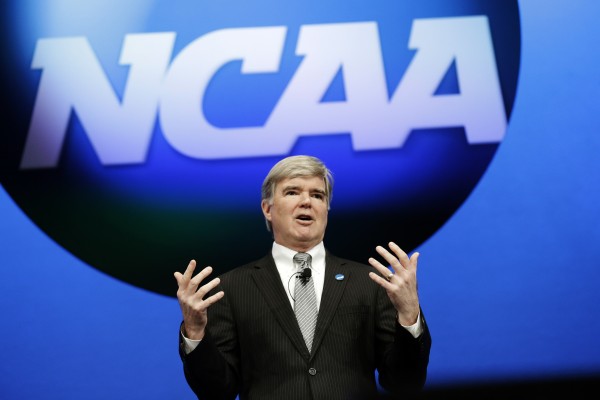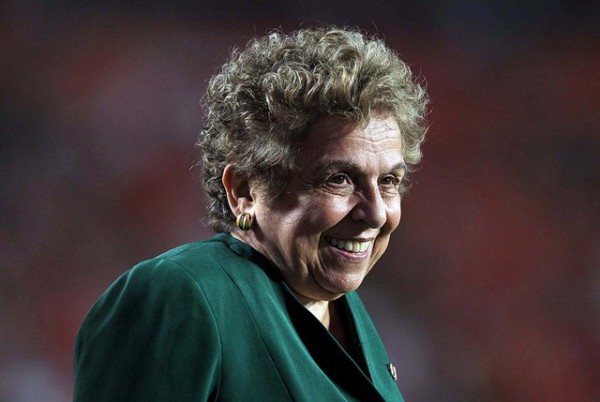NCAA Closes the Book on Miami Scandal as Frank Haith Skates
Posted by Matt Patton on October 23rd, 2013Yesterday, over two years after Nevin Shapiro contacted the NCAA with allegations of wrongdoing throughout the athletic department, Miami finally got closure from the Committee on Infractions in a scathing 102-page report that confirmed nearly all of the substantive allegations from Charles Robinson’s initial report. More specifically, the NCAA found that Miami “lacked institutional control” in both overlooking Shapiro’s violations and actively covering them up after the fact.

Mark Emmert and the NCAA seemed bigger than life before handing down Miami’s judgement. (AP/LM Otero)
The most serious punishments were reserved for some of the coaches implicated — Frank Haith (“former head men’s basketball coach”), Jorge Fernandez (“former assistant men’s basketball coach B”), and two former assistant football coaches — each of whom received punishments ranging from a five-game suspension for Haith (now at Missouri) to a two-year show-cause for Fernandez. The football team will lose three scholarships per year over the next three years, and the basketball team will lose one scholarship per year over the same time. All of this comes on top of the university’s self-imposed punishments, which were significant. But the penalties are a far cry from two years ago when Mark Emmert threw around the phrase “death penalty” with various major media outlets.
From a distance, the heavy-handed wrist-slapping makes sense: The NCAA overstepped its authority by collaborating with Shapiro’s lawyer to effectively gain subpoena power in the absence of legal authority to do so. Add in a slowly growing disdain for the NCAA and its inconsistent handling of recent big-time scandals (see: USC, Ohio State, and North Carolina) with a Penn State bombshell that put “impermissible benefits” in proper perspective, and you have a PR nightmare in Indianapolis. After evidence of impropriety in the investigation surfaced, Miami wasted no time leveraging the new public perception to its advantage.
The NCAA was forced to investigate itself, firing both the lead investigator on the case and its Vice President of Enforcement. Improper testimony was not considered, but the case still relied heavily on information provided by a man currently serving prison time for running a $930 million Ponzi scheme. Had the NCAA hammered Miami, there is no doubt that Miami’s legal team would have retaliated against the NCAA with yet another expensive lawsuit. What appears to be an unspoken compromise was reached: The NCAA allegations would stay, but the capital punishment would go.

Donna Shalala may not flaunt it, but her leadership put Miami in the best possible position. (Allen Eyestone/The Palm Beach Post/Zuma Press)
Upon closer inspection, though, the cracks in the NCAA enforcement fortress were only made worse by this outcome. After the fairly substantial sanctions against Ohio State and USC, a scandal far more involved earns a few reduced scholarships and two self-imposed bowl bans?
Perhaps even more glaring, Haith was found to have lied to the NCAA about working with an assistant to pay Shapiro $10,000 in order to keep him from talking and later attempting to cover it up. In contrast, former Tennessee head coach Bruce Pearl got a three-year show-cause penalty for lying to the NCAA about having a student-athlete at his house during a barbeque! Kelvin Sampson got a five year show-cause for what amounted to a number of impermissible phone calls! How can paying off a rogue booster to keep him quiet — and later changing your story to cover it up — constitute a less severe punishment than lying about routine secondary violations? It is true that multiple assistants of Haith’s also got show-causes, but something doesn’t add up. Did the NCAA have to cut a deal with Haith, who still denies the allegations and has threatened legal action against the NCAA for reportedly illegally accessing his bank accounts? Even if it didn’t, the punishment feels weak where other recent scandals incurred the full wrath of Mark Emmert and his investigators.
And in the end, that will be the legacy of the Miami case; Miami’s recruiting won’t be hurt by losing a single basketball scholarship for a while. But NCAA enforcement will never regain that aura of invincibility that allowed it to levy unprecedented fines, revoke championships or show a top program’s coach the door on a spiteful whim. While the scope of Shapiro’s NCAA legacy remains to be seen, this case thus far did more damage to the NCAA’s image and power than any of its 15 pending lawsuits.









































